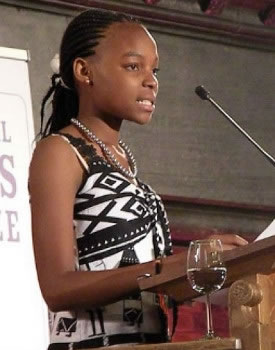Born in 1991, Thandiwe Charma grew up in Zambia, in the midst of the AIDS/HIV epidemic. She saw first hand how it devastated the lives of the people she knew who both did and did not have the disease. When some of her teachers died from the disease, there became a shortage of teachers and schools were forced to close. She realized that there was a legitimate threat to children’s right to education.

What amazes me is that even at such a young age, she was only 8 at the time of her school closure, she knew and believed in the importance of education. She believed that it is a basic right for every child and her activism was shaped by her upbringing in a poor neighborhood in Zambia where many children, especially girls did not have access to education or learning. Thandiwe wanted to change this.
Something Thandiwe said that has really stuck with me is “When you educate a child you educate the nation. And an educated society is a developed country”. I find this quote very revealing of Thandiwe’s beliefs and motivations behind her activism. She knows that education can make nearly every aspect of society accessible to those that have it and that if every person in that society is educated the society itself is stronger.
At the age of 8 when her school was forced to close she persuaded 60 other children to participate in a march to a neighbouring school, to claim their education back. They demanded to be admitted there. The children on the protest were accepted. This was only the first act in her career as an activist. HIV/AIDS is something Thandwie is working to eradicate and for her this change starts with children. She is aware that educating children on the illness and how it is contracted and treated is key to preventing further cases. Because of this she published a children’s book “The chicken with AIDS”. A story about how a chicken with AIDS infects a duck. This book has become a key educational tool, used to inform and teach young people about the illness.
I love Thandiwe’s approach to her activism. Taking a grassroots approach and starting with the youngest people in society who she believes and knows can bring the most change. She realizes that children make some of the best advocates and activists because unlike adults they don’t seek power, all they want is change. I personally think that that’s amazing.
When Thandwie was 16 she won the International Children’s Peace Prize. She continues to work as an activist, supporting the rights to children’s education and fighting for a world without HIV/AIDS.
